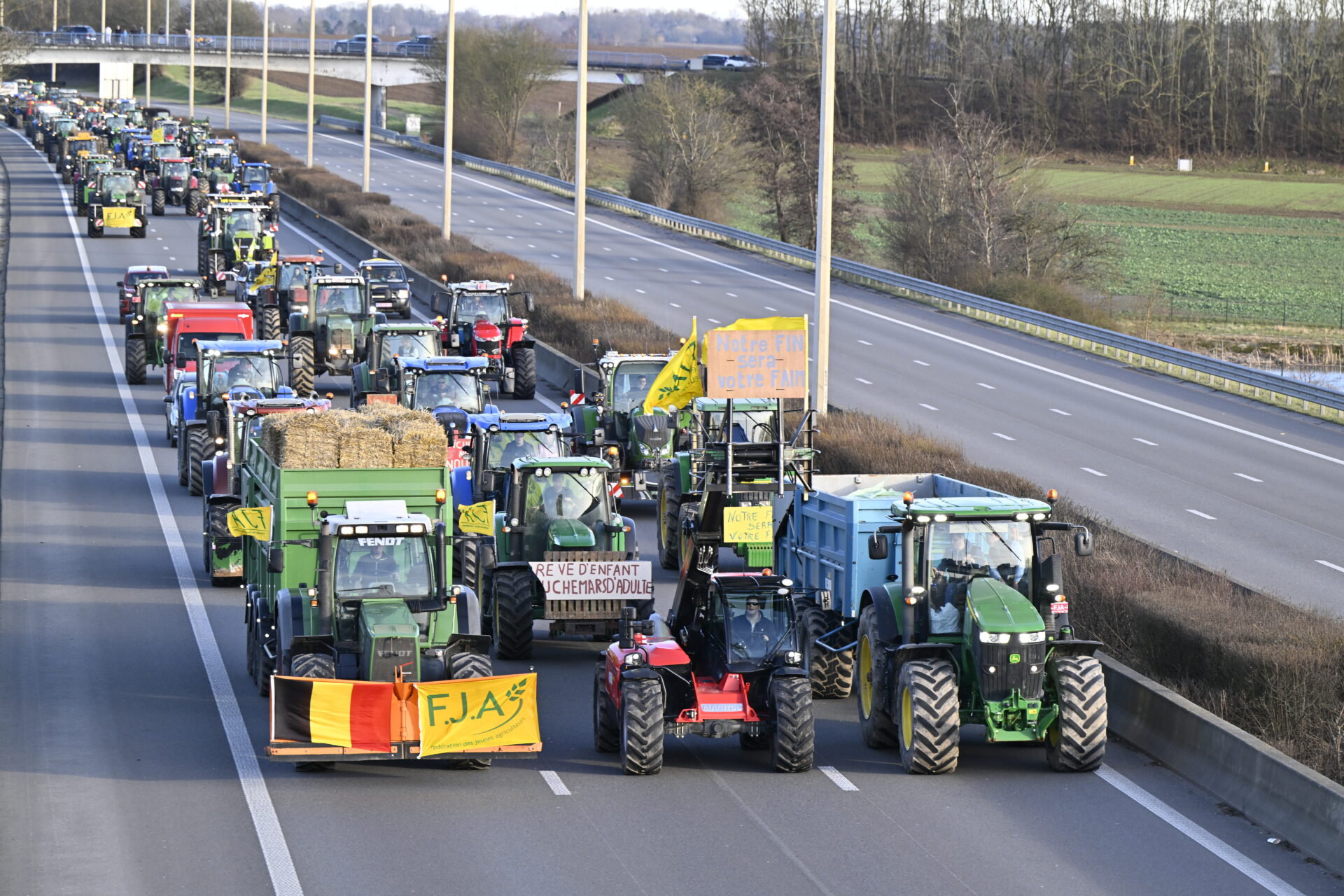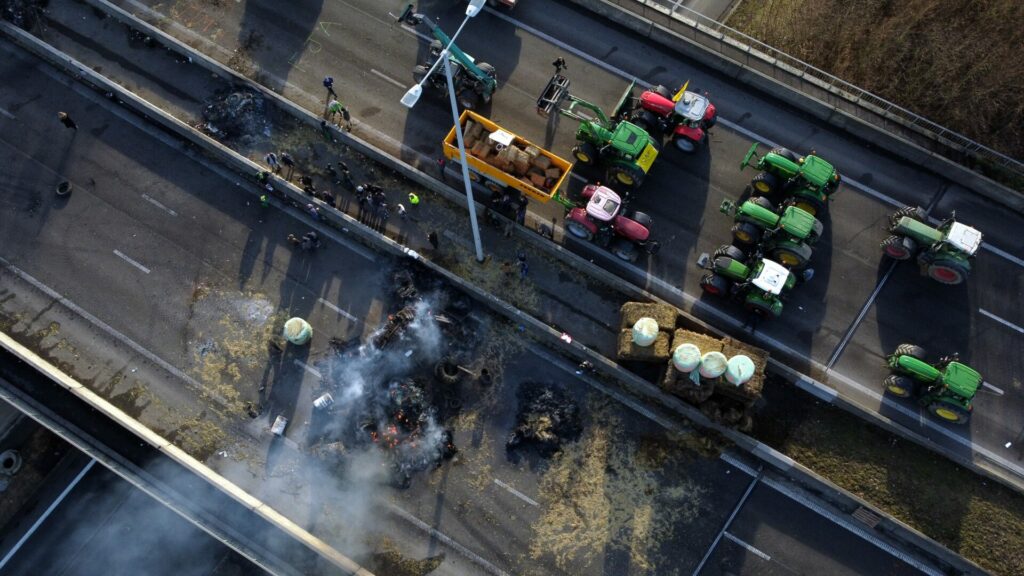Farmers' protests continued on Tuesday, with tractors blocking major roads up and down the country, which disrupted morning as well as evening rush hour.
The mobilisation has been organised to call out high administrative burdens for farmers, climate regulations and other issues. The large demonstrations by farmers that started in France have for several days taken place in Belgium.
The protests have disrupted traffic in the country since the end of last week when two separate convoys of stationary tractors blocked the intersections on the A4-E411 towards Brussels and Liège, resulting in various sections of the motorways being closed to traffic.
Disruption continued on Monday. Farmers blocked the inner and outer ring roads around Brussels (R0) in Halle, causing traffic jams of over an hour during the morning rush hour. The tractors were supposed to disperse after rush hour but have extended the protest until the evening.
The blockade continued on Tuesday morning, the Flemish Traffic Centre (Vlaams Verkeerscentrum) confirmed. The Brussels Ring Road (R0) is still closed between Parking Halle and the Halle interchange on the Inner Ring Road while the Outer Ring Road is shut off from Huizingen to Nivelles, it noted on social media.
"Due to a demonstration, there is disruption near Halle. On the E429/A8 coming from Doornik you have to leave the motorway at the intersection with the N25 Nijvelsesteenweg."
Inside Brussels, some 20 tractors blocked the Square de Meeûs near the European Parliament on Tuesday morning, the Brussels police reported. The farmers were mainly from the Charleroi region and were taking part in the general farmers' protest. Police expect more farmers to join on Tuesday night and evening, and they are planning to stay in the capital until Thursday when a European summit will take place in Brussels.
Disruptions in Wallonia
In Wallonia, the blockade of the A7/E19 motorway by farmers also continued on Tuesday morning, the Federal Police's Inforoutes website warned. The motorway A7/E19 towards Brussels has been closed at Haut-Ittre, with a diversion in place via the Brussels Ring Road in Zaventem.
The same motorway in the direction of Mons has been closed at the Nivelles junction. The diversion here is on the A54 at Charleroi.
In Namur, the protest resulted in damage to the surface at Daussoulx, resulting in a section of the E42/A15 being closed in both directions. Drivers are asked to travel via the E411 Namur-Brussels interchange. In Luxembourg, the N85 between exit 55 to Villeroux and the exit Aye on the N4 have been closed.

Tractors drive slowly, blocking traffic, during a farmers' protest at the Daussoulx interchange with highways E40 and E411. Credit: Belga / Eric Lalmand
"Major disruption is expected on Namur's road network and routes leading to the city centre," the police noted. "From the early morning, with no precise timetable, columns of tractors will form on the four main roads leading to the centre of Namur," before converging in the city centre.
In Hainaut, the motorway A7/E19 has been closed due to the protest at Houdeng-Goegnies. The police have advised drivers travelling to Brussels to take the A54 at Charleroi instead. People travelling from Liège have been told to take the same road.
Spreading further
The protests also spread to other locations in Flanders on Tuesday morning. Local police noted that the Antwerp Ring Road in the direction of Ghent was blocked at the Merksem overpass near the Sportpaleis venue, where farmers took up the entire width of the motorway. Later in the morning, long traffic jams started to form on all approach roads to Antwerp.
The blockade was lifted around 10:20, however, the protest caused damage to the road surface. For the repair works, two lanes in the direction of Ghent have been closed.
The Ring Road towards the Netherlands is also completely free after smoke resulted in two lanes being closed, but the column of tractors that occupied the viaduct is now using that road to head north again. The Traffic Centre and Antwerp police are asking people to take serious delays into account here.
Evening rush hour
In West Flanders, farmers and horticulturists blocked access roads to the port of Zeebrugge later in the day. The farmers want to protest at the port, "because industry is allowed to emit 40 times more than we as farmers." The slip roads from the A11 to the port of Zeebrugge have been completely blocked by some 20 tractors since 14:00 and more farmers are said to be on their way. On the E17 motorway near Kortrijk in the direction of France, the road is blocked as well.
Around 18:00, several farmers arrived on the E40 motorway in Bertem (near Leuven), which they blocked. The A12 from Meise to Strombeek-Bever in the direction of Brussels is also blocked, the Flemish Traffic Centre reports.
In East Flanders, farmers have closed "almost all the entrances" to the E17 and E34 motorways. In Antwerp, a column of tractors entered the E34 and spread out over the entire carriageway. The motorway was also blocked near Beerse, in the direction of Antwerp, as was the Turnhout ring road (R13).
Related News
- Farmers' protests: Local farmers plan to blockade Zeebrugge port on Tuesday
- Germany: Farmers block access to several ports
Flemish Minister-President Jan Jambon has urged Home Affairs Minister Annelies Verlinden to take "the necessary measures" to lift the blockades, adding that the way the protests are being conducted is creating security problems. Verlinden noted that the police are not intervening hard-handily but are instead focussing on dialogue and consultation with the umbrella organisations and the protesting farmers.
The Farmers' Union president Lode Ceyssens has asked people whose commute has been disrupted to understand what he calls the desperation of Flemish farmers. He said on Radio 1 that farmers across the country "are overwhelmed by a tsunami of regulations from Europe, which the Member States then transpose."
To add salt to the wounds, farmers feel their complaints are not taken seriously, and that they are being patronised by not being included in a dialogue towards a solution, said Ceyssens. However, a strategic dialogue was launched by the European Commission last week to decide a more inclusive way forward when it comes to future legislation that will impact the agricultural sector.

